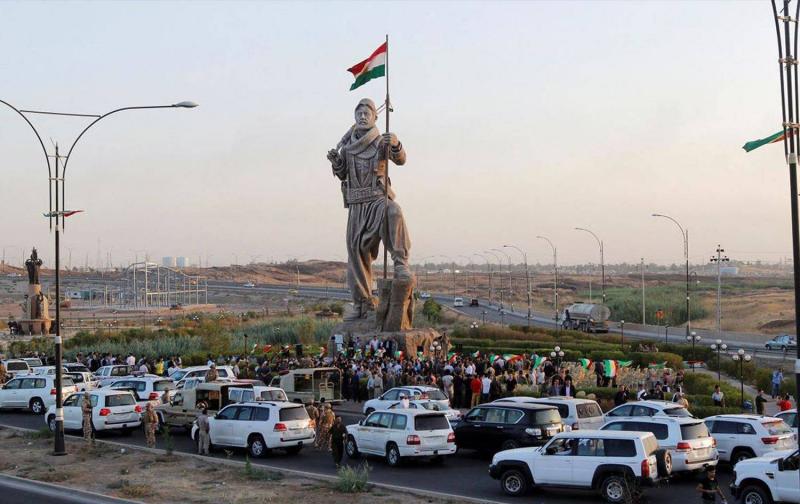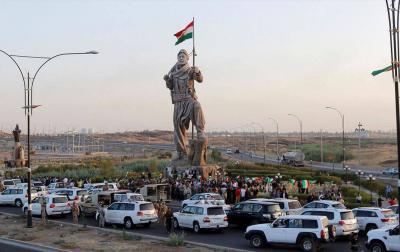Iraqi Prime Minister Muhammad Shia' al-Sudani decided on Saturday evening to impose a curfew in Kirkuk province following the deaths of four people and several others injured in the disturbances in the area. Meanwhile, Iraqi President Abdul Latif Rashid called on all parties to refrain from using or threatening force. According to sources from the police and security in Iraq, security forces were deployed in the northern oil city of Kirkuk on Sunday to prevent further violence.
Kirkuk police spokesman Amir Shwani reported that the curfew has been lifted and vehicles are moving normally in the city today. Al-Sudani, in a statement released by his spokesman, urged security forces to be firm in dealing with the events in Kirkuk and not to allow anyone to carry arms except for security personnel. He also called on "all political parties and social and popular entities to play their role in averting strife and maintaining security, stability, and order" in Kirkuk province.
Meanwhile, the Prime Minister of the Kurdistan Region of Iraq, Masrour Barzani, condemned "the attacks that led to the deaths and injuries of several Kurdish citizens" in Kirkuk, calling on the leader of the Kurdistan Democratic Party, Masoud Barzani, to urge the Iraqi Prime Minister to end "the discrimination targeting the unity" of Kirkuk. Masrour Barzani stated in a statement that "the riots in Kirkuk contradict the principles of democracy and peaceful coexistence," urging Al-Sudani for "immediate intervention to control what he described as the unacceptable situation to protect the lives of citizens and protesters."
He added: "We call on Kurdish citizens in Kirkuk to exercise restraint and avoid violence, and we urge Arab and Turkmen citizens not to allow outsiders to disrupt the stability of the city." For its part, the Patriotic Union of Kurdistan called on the Prime Minister to "intervene directly and eradicate the problem from its roots in coordination with the local government and the army and hashd forces" in Kirkuk.
Later, Al-Sudani and the President of the Kurdistan Region of Iraq, Nechirvan Barzani, emphasized the importance of not allowing what they called "irresponsible elements" to target the social fabric of the province. Nechirvan Barzani confirmed that Kirkuk needs "the application of law and the constitution rather than more unlawful acts," calling on security forces to protect the security of all components of Kirkuk "without discrimination."
In Baghdad, the Iraqi President called on all parties concerned with developments in Kirkuk to refrain from any use of force or threats. He also urged "everyone to prioritize the interests of the people and the stability of the country over any other interests... and not to give room or provide opportunities for terrorist gangs aiming to confuse the situation and undermine stability and spill Iraqi blood." Rashid also called for the federal government and security forces "to intervene seriously to control the situation in Kirkuk and ensure security and the rule of law."
Earlier, Kurdistan 24 reported that there were fatalities and injuries resulting from gunfire at protesters in Kirkuk demanding the reopening of a main road with Erbil in northern Iraq. The television quoted a source stating that Kurdish Peshmerga forces were deployed in the Altun Kupri area northwest of Kirkuk to "maintain security conditions and prepare for any emergency events" in the region. The Kirkuk police leadership confirmed that they would not allow "any party to disrupt" the city's security, stating in a statement that "strict legal measures will be taken against anyone carrying weapons," stressing that security forces "stand with all the city's residents equally to protect them."
Protests by Arabs and Turkmen in Kirkuk against the presence of the Kurdistan Democratic Party led by Masoud Barzani recently turned into sit-ins and roadblocks with Erbil. This is the third such protest in the oil-rich province since 2019. The demographic composition of Kirkuk consists of three ethnicities: Turkmen, Arabs, and Kurds, who are the minority. However, the Kurdish parties operating in the province have attracted tribal sheikhs from the Arabs and Turkmen, tipping the balance in their favor in controlling the province. There is also a minority of Christians living in Kirkuk. Since 2003, following the change of the previous regime, Turkmen and Arab parties in Kirkuk have accused Kurdish parties of implementing a calculated program to "Kurdify" the province, starting with the influx of hundreds of Kurdish families in the spring of 2003 and settling them around oil fields under the pretext of repatriating villages that were abandoned by the previous regime as part of its Arabization policy.




